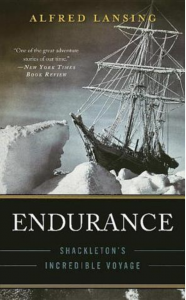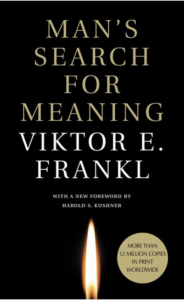C.A. Gray's Blog, page 30
May 6, 2022
Man’s Search for Meaning, Victor Frankl
Today’s podcast comes from this blog review of Man’s Search for Meaning.
The post Man’s Search for Meaning, Victor Frankl appeared first on C.A. Gray.
April 29, 2022
Review of Endurance

I listened to this alternately as I listened to “Man’s Search for Meaning,” and I think the two made an interesting and insightful contrast. While I don’t generally find pure adventure stories all that interesting (there are only so many things that can go wrong, and after awhile you kind of get the gist), this was different because it’s a true story. I considered how much these poor men went through–and how the worst of it, I would think, would have been the interminable perseverance required, day in and day out, never knowing when or if it would end. (“Endurance” was such a perfect name for their ship!) Each day was filled with a myriad of miseries great and small, with utter boredom and probably a sense of total purposelessness, since they were accomplishing nothing save their own survival. They didn’t even succeed in what they’d set out to do, which was to map Antarctica. One thing after another went wrong, as months turned into years. They overcame one obstacle only to be confronted by another. And yet… not a single man lost his life, from 1914-1917, for most of that time stranded in perhaps the most inhospitable place on earth.
What’s fascinating to me is that, while each day may have felt pointless to Shackleton and his men, their endurance *was* their accomplishment. It’s actually what Shackleton is most remembered for in all his life–at least I think so, as I’d never otherwise heard of him before–even though technically, his mission was a failure. In light of Frankl’s book, they were living for a purpose: to survive, and to do all they could to ensure the survival of the others as well.
My rating: ****
Language: none
Sexual content: none
Violence: there’s one amputation without anesthesia, but it’s not graphic
Political content: none (though how fascinating that they were gone for almost the duration of WWI! What a different world they would have come home to!)
The post Review of Endurance appeared first on C.A. Gray.
Prophet by Frank Peretti
Today’s podcast comes from this blog review of Prophet by Frank Peretti.
The post Prophet by Frank Peretti appeared first on C.A. Gray.
April 22, 2022
We Belong Together, Beth Moran
Today’s podcast comes from this blog review of We Belong Together.
The post We Belong Together, Beth Moran appeared first on C.A. Gray.
April 18, 2022
Review of Man’s Search for Meaning

Wow. I’d previously only read the “Blinkist” version of this book, but it loses so much when stripped of context (which I think is true for nearly every book worth reading, really–that’s why I got rid of that app.)
Had this just been memoirs from Auschwitz, I don’t think I’d have read it, as I tend to avoid media that is unnecessarily grim. But the memoirs were crucial for the message–which I might have a hard time summing up. Frankl described the horrors of the concentration camp, but from the perspective of a psychologist who marveled at the coping mechanisms and resilience of the mind. He contrasts those who survived from those who didn’t by one key difference: whether or not that person had a purpose to live for. Those who saw no greater purpose lived only for what little pleasure could be had in the moment, and he knew that that prisoner would soon waste away and die. But those who lived for something greater than themselves–whatever that something might be–endured. “Those who know the ‘why’ of their existence can bear almost any ‘how,'” he wrote, though he attributed this quote to Nietzche.
But the form that “why” takes is different for each person, and must be freely chosen. It might be a future goal he wants to accomplish, or a person he wants to live for, or people he wants to encourage around him. Frankl developed the psychotherapeutic technique called Logotherapy, in which meaning is found through the choices one makes and his responsibility for those choices. The second half of the book is all about the technique, and not about his concentration camp experiences — those were more an illustration. The therapy also employs “paradoxical intention,” which to me sounds essentially like the psychological version of homeopathy. It’s facing your fear, focusing on the very thing you’re trying to shove out of your mind, and thus, de-fanging it. The example he gave that I think would resonate with most is the insomniac who gets anxious as bedtime approaches, fearful that he won’t fall asleep… and then of course he doesn’t, because the neurotransmitters involved in anxiety are incompatible with sleep. Another is the intrusive thoughts one tries not to entertain, which only loom larger from the effort. “Don’t think of a pink elephant,” in other words. The concept behind homeopathy, and hydrotherapy too really, is to push the body in the direction it’s already going so that it will self-correct in the opposite direction.
After hearing this segment of the book, I might have liked to have heard him cycle back to the camp experiences and draw clearer parallels. But in retrospect, he did discuss how one surefire way to lose heart would be to anticipate release by a particular date. When that date approached and then passed, the prisoner would lose hope and die of a broken heart. “Hope deferred makes the heart sick” (Proverbs 13:12). In the same way, the direct focus upon pleasure for pleasure’s sake was empty. One cannot aim for happiness itself; happiness is a byproduct of purpose. Chase it outright, and it will forever elude you. But, “seek first the kingdom of God, and His righteousness, and all these things shall be added to you” (Matthew 6:33).
My rating: *****
Language: none
Sexual content: none
Violence: plenty but not gratuitous
Political content: none
The post Review of Man’s Search for Meaning appeared first on C.A. Gray.
April 15, 2022
The Midnight Orchestra by Jessica Khoury
Today’s podcast comes from this blog review of The Midnight Orchestra: A Mystwick School Novel.
The post The Midnight Orchestra by Jessica Khoury appeared first on C.A. Gray.
April 13, 2022
Review of We Belong Together

I found a new favorite author! This is the second book I’ve read by Beth Moran (the first was Christmas Every Day) and they were both just delightful. I’m not generally a chick lit kind of a girl, but they were chick lit in all the best ways and without the drawbacks (which usually tends to be an insecure, over-the-top quirky main character, sappy romance, overt sexual content, and a predictable plot.) Moran’s books do still follow a bit of a formula so far, but they don’t check those boxes for sure. The main character is likable but down on her luck. She’s forced for one reason or another to relocate to a romantic off-the-grid hideaway, where she meets the boy-next-door type of guy. She falls for him, of course, but there’s a clear complication that, for a time, means they can’t be together. Meanwhile, she is embraced by lovable townspeople, finds herself in a new endeavor, and also supports her new friends as they achieve their dreams.
The specifics of this one were a surprise though, and while I knew in the big picture where it was going, I definitely didn’t know the details. Eleanor Sharpley was an internet influencer under the pseudonym Nora Sharp, as a food critic–except she was kinda sorta pressured into becoming super nasty in her reviews by her publisher. The meaner she was, the more her fame grew. But then, someone she hurt, either directly or indirectly, decided to get even. They turned into a stalker, and Eleanor felt so threatened that she ran. She had to go somewhere completely off the grid, where they couldn’t find her, and so she thought to run to her best friend Charlie’s house. But Charlie was always flighty, so they haven’t actually spoken in a year. On the way, Eleanor’s car broke down, and a passing stranger with a baby in the car rescued her. Eleanor discovers that said stranger, Daniel, happens to live at her destination–only Charlie isn’t there. She died, and Eleanor didn’t even know.
Daniel turns out to be Charlie’s brother, not her ex, and he adopted her baby. The charming house has fabulous potential, but it’s a wreck because Daniel is now a single parent and working all the time. One thing leads to another, and Eleanor becomes his new roommate and his daughter’s nanny. She also takes on what they later discover was Charlie’s dream of making over the place as a bed and breakfast retreat. Meanwhile, there’s a feud going on with the townspeople on different sides of “the river,” hearkening back to events from 100 years earlier. Eleanor, determined to become a better person than Nora was, and to do something good in the world, attempts to mend the rift. The romance with Daniel is a slow burn, because Eleanor is afraid to tell him who she really is. She’s afraid he won’t be able to see past it. Also, her stalker hasn’t given up. As the threats get closer to her new home, Eleanor is forced to choose between maintaining her anonymity and protecting the people she’s come to love.
The story still has a happily-ever-after, though it’s done in a believable way. I love all of the supporting characters, too, and the conflict resolution in the town adds another feel-good layer to the tale. Will definitely be reading more by Beth Moran!
My rating: *****
Language: very little if any, I can’t totally recall
Sexual content: none, surprisingly!
Violence: none though there’s some almost violence
Political content: none
The post Review of We Belong Together appeared first on C.A. Gray.
April 8, 2022
Ben-Hur, by Lew Wallace
Today’s podcast review comes from this blog review of Ben-Hur.
The post Ben-Hur, by Lew Wallace appeared first on C.A. Gray.
April 4, 2022
Review of The Midnight Orchestra (Mystwick #2)

So fun! I’d read the first book in this series and enjoyed it, but then forgot about it until I saw it in part of the free books included with my audible membership this month. I’m glad I rediscovered it!
A lot of the middle-grade lighthearted writing style, the whimsy, and even the plot reminds me of Harry Potter. It’s music-craft instead of witchcraft, and the students use instruments instead of wands to work their magic. The main character, Amelia, has two sidekicks, Jai and Darby, and in this one there was even a “Malfoy” character, Mia. The teachers are quirky just like the Hogwarts professors, and some of the magical antics are just like the kinds found in the HP series. That’s part of what I loved about it, though I did think the plot itself was original. In the last book, we learned that Amelia was accepted to Mystwick on accident, having gotten the acceptance letter for another Amelia Jones who died in a tragic accident. In this one, we learn that she didn’t die–in fact, she shows up, goes by Mia (to avoid confusion), and claims her rightful place. She also is Amelia’s nemesis for apparently no good reason.
Meanwhile, Amelia gained the acceptance of the school when she composed a black magic spell in the last book to summon ghosts. During an episode of magical havoc at Mystwick, Amelia finds herself called to the Midnight Orchestra, an orchestra said to exist only in myth, and conducted by Mr. Midnight himself. He gives her a seed that will give her access to a powerful spell, but with the caveat that if she uses it, she will owe him a favor. She’s determined never to do so, but then when goaded by Mia and made to feel worthless, she does. Unfortunately, Mr. Midnight appears to claim his due–or else. At school, Amelia is one of few actual composers, and she’s gearing up for a school competition in which her team will perform the spell she got from Mr. Midnight’s seed. But when Mr. Midnight threatens Jai, Amelia has to choose what really matters, and face the demons of her own past in order to compose her way out of a seemingly impossible situation.
I love how the story manages to stay lighthearted the whole way through. Enemies become friends, good triumphs over evil, and Amelia manages to remain a good role model for kids.
My rating: ****1/2
Language: none
Violence: none
Sexual content: none
Political content: none
The post Review of The Midnight Orchestra (Mystwick #2) appeared first on C.A. Gray.
April 1, 2022
Starflight by Melissa Landers
This week’s podcast comes from this blog review of Starflight.
The post Starflight by Melissa Landers appeared first on C.A. Gray.



